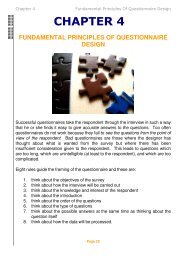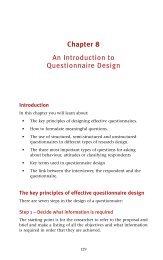The growing business handbook : inspiration and advice ... - Sparkler
The growing business handbook : inspiration and advice ... - Sparkler
The growing business handbook : inspiration and advice ... - Sparkler
Create successful ePaper yourself
Turn your PDF publications into a flip-book with our unique Google optimized e-Paper software.
39<br />
Whole company<br />
innovation<br />
2.1<br />
Innovation is becoming a group sport, says Garrick Jones, a research fellow at<br />
the London School of Economics <strong>and</strong> a partner at the Ludic Group<br />
<strong>The</strong> collective knowledge in any commercial organization contains a wealth of<br />
contextual information – a vital source of ideas for innovation. Nobody knows<br />
more about the market, customers, issues, trends <strong>and</strong> opportunities than those who<br />
are working with these realities on a daily basis.<br />
<strong>The</strong> question is how to best get at that knowledge in a way that takes maximum<br />
advantage of it <strong>and</strong> leads to real innovation in products <strong>and</strong> services?<br />
We call this approach the whole company approach to innovation. It is a multilayered,<br />
yet simple combination of people management, design events, product<br />
research <strong>and</strong> development, <strong>and</strong> lean continuous improvement principles that lead to<br />
rich, innovative outcomes. Through careful sequencing of multi-disciplinary events<br />
throughout the design process, new products <strong>and</strong> services are informed by the<br />
knowledge of those closest to the market. A model for this could be continuous cycles<br />
of learning, creating <strong>and</strong> communicating,<br />
<strong>The</strong> nature of work is rapidly changing. Most innovation <strong>and</strong> production is<br />
project led, powered by workshops that disappear after its goals are achieved. This is<br />
becoming as true for aircraft production as it is for the development of new customer<br />
experience-based products in the service industry.<br />
<strong>The</strong> rise of the Internet has also led to new conditions for work. On the one h<strong>and</strong><br />
increased customer intimacy <strong>and</strong> knowledge, <strong>and</strong> on the other the loss of proximity<br />
between working teams. Teams may be working on components of a solution across<br />
geographic <strong>and</strong> time boundaries. <strong>The</strong> time that teams are able to spend together has<br />
become increasingly precious. How can the most be made of those interactions?<br />
One response to tapping into the contextual knowledge resources of the workforce<br />
are Design Workshops (also known as Lab Events). No longer is innovation the<br />
domain of the specialist removed from the real world, cooking up new ideas in a<br />
distant lab. Innovation is the product of many stakeholders collaborating to create<br />
unique solutions to existing problems, or creating new markets, <strong>and</strong> new types of<br />
customer experiences.<br />
For reasons to do with the growth of the knowledge economy, innovation <strong>and</strong><br />
competitiveness, organizations require new skills, <strong>and</strong> are under pressure to be<br />
‘porous’ using networks, strategic alliances <strong>and</strong> partnerships to achieve their aims.








